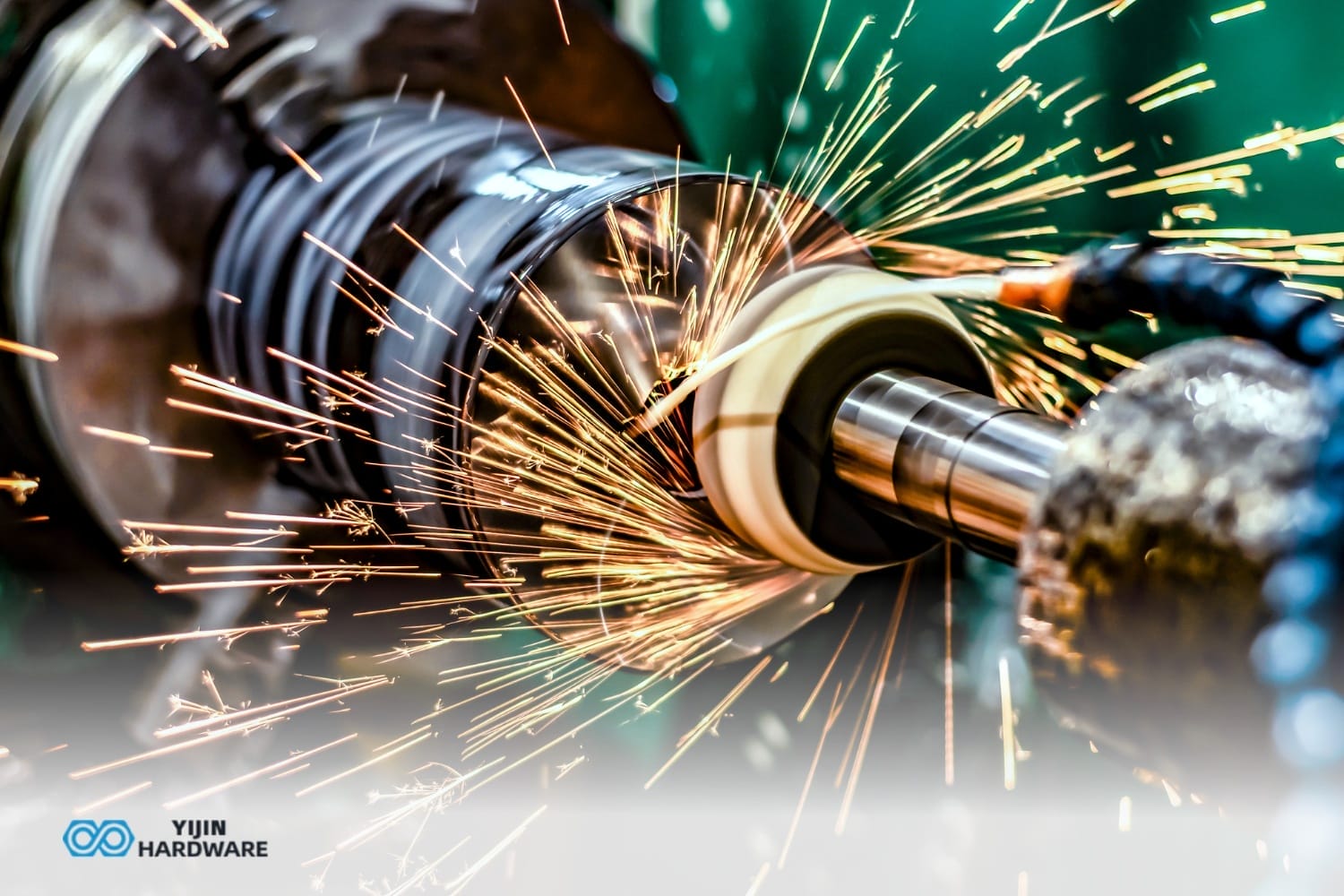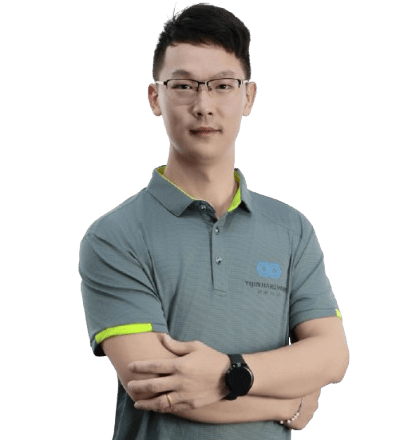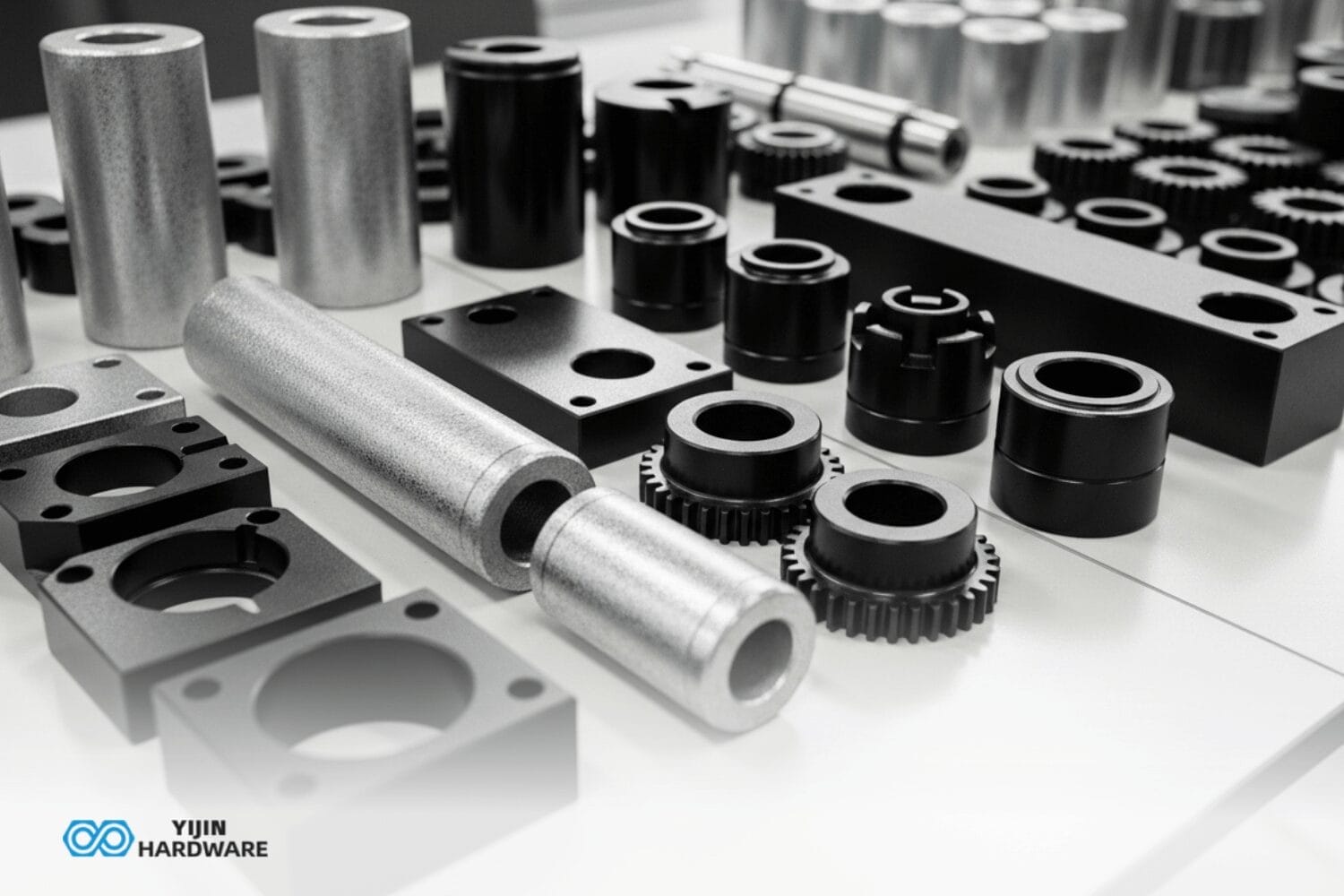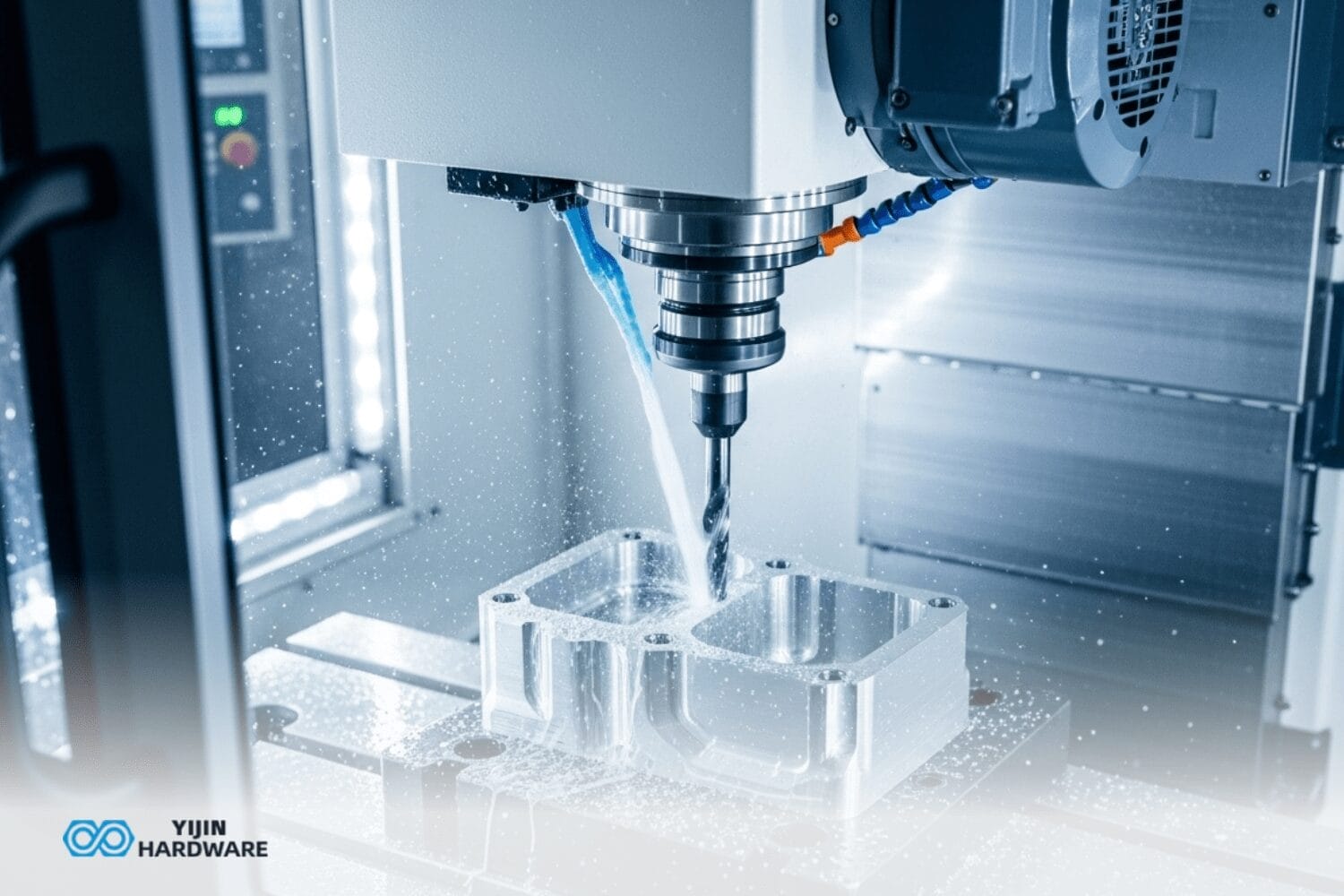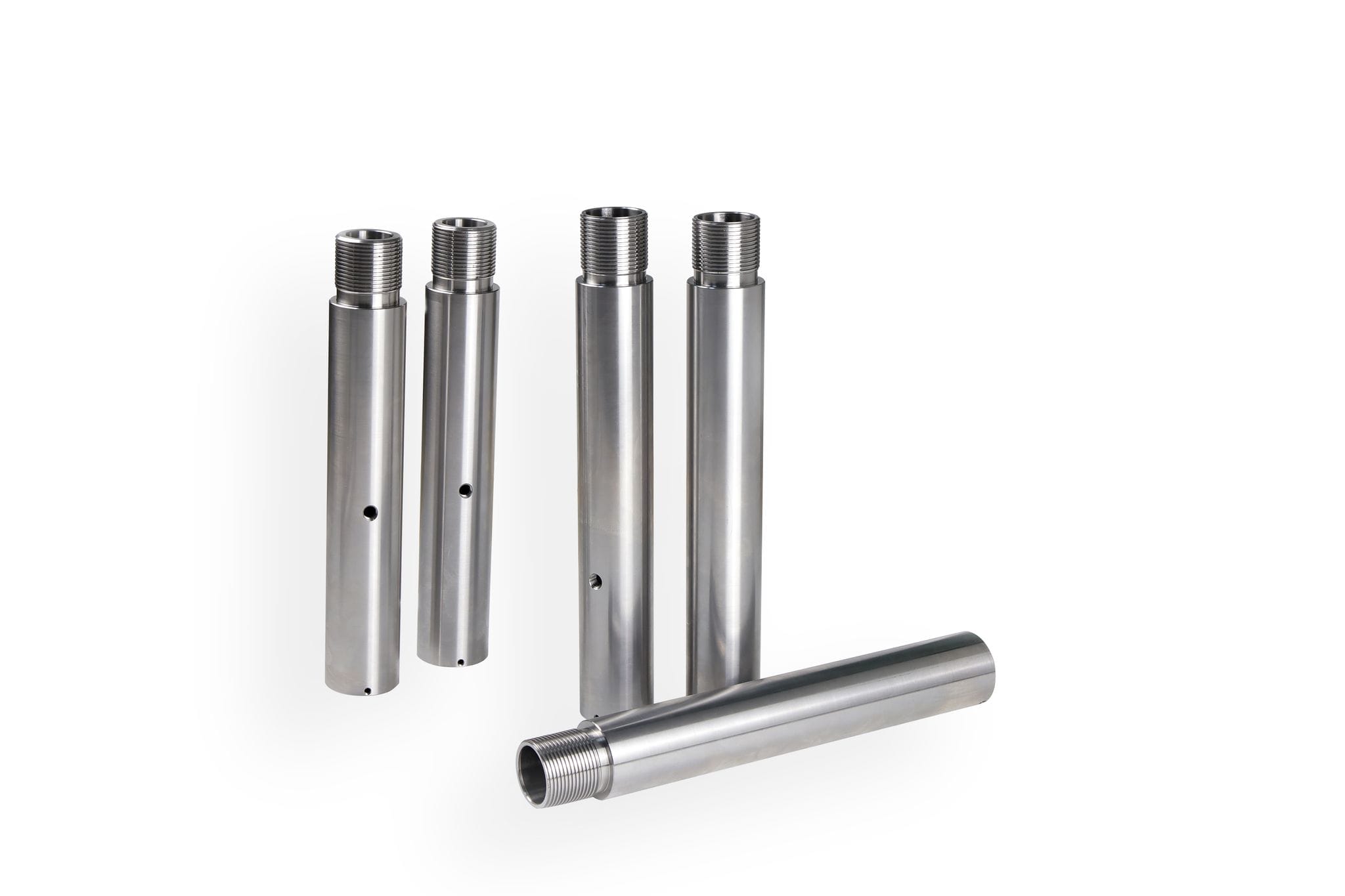As a global leader in the field of industrial robots, KUKA faced multiple challenges in developing high-strength aluminum alloy robot arm parts, including multi-surface contour ±0.05 mm precision control, 25-50μm hard oxide layer uniformity treatment, and 5,000 pieces from proofing to mass production within 3 months.
YIJIN Hardware completed the process, from order to delivery, in just 28 days through 5-axis CNC milling technology, customized hard anodizing process, and DFM feasibility optimization. Yijin achieved a 99.8% pass rate for key dimensions of parts, which is 35% faster than the original supplier and required 18% lower production costs, fully meeting its intelligent production needs.
Who is KUKA?
KUKA AG is a global leader in industrial robots and automation technology, the company is deeply engaged in industrial intelligent 4.0 solutions. Its business covers multiple high-end manufacturing fields such as automobile manufacturing, electronics, and food industry. It has more than 13,000 employees and dozens of overseas subsidiaries worldwide.
Kuka’s main products are industrial robot systems (covering 6-axis robots, collaborative robots, etc.), automated production lines, intelligent production systems and digital solutions. Its robot products are known for their high precision and high load capacity, and are widely used in scenarios such as automotive welding and electronic component assembly.
What did KUKA need?
Part type: The core structural part of the robot arm is made of aluminum alloy 6061. It needed to meet the dual requirements of being both lightweight and high strength. The structure includes multi-curved complex contours and precise assembly holes.
Technical indicators:
- The dimensional tolerance is controlled within ±0.05 mm, and the surface roughness of the key mating surface is Ra≤0.8μm;
- The surface treatment requires hard anodizing, the oxide layer thickness must reach 25-50μm, the hardness must be ≥300HV, and the salt spray resistance test must exceed 1000 hours.
Mass production requirements: From prototype verification to mass production of the first batch of 5,000 units, the overall cycle is required to be controlled within 3 months to support the rapid commissioning of the new production line.
Previous Attempts with European Suppliers
KUKA previously faced two major bottlenecks when working with local European suppliers to meet the construciton of this core robot
- Insufficient precision stability: Traditional 3-Achsen-Bearbeitung is difficult to meet the precision requirements of multi-surface contours, and the pass rate of key dimensions is only 92%, requiring multiple reworks.
- The delivery cycle is long: it takes 4–6 months from proofing to mass production, and the material loss rate during the small-batch trial production stage is as high as 25%, which cannot match its fast-iteration production rhythm.
In order to break through the bottlenecks of production capacity and precision, KUKA seeks suppliers with multi-axis CNC processing capabilities, rapid proofing mechanisms and special surface treatment experience to achieve efficiency upgrades in the smart manufacturing process.
Further Challenges for Robot Arm Part Manufacturing
KUKA faces three major systemic challenges in the manufacture of robot arm parts:
- Insufficient precision control capability: The tolerance requirement for parts with multiple curved surfaces and complex contours is ±0.05 mm, but traditional 3-axis CNC machining results in a critical dimension qualification rate of only 92%. Manual secondary polishing is required during assembly, and the rework rate for a single batch exceeds 15%, which directly affects the overall motion accuracy of the robot.
- Surface treatment process bottleneck: The thickness of the hard oxide layer needs to be stabilized at 25-50μm, and the uniformity error must be ≤5%. However, the oxidation treatment of the original supplier has a local thickness deviation of more than 10%, and the salt spray resistance test can only pass 500 hours, which cannot meet the long-term outdoor operation needs of industrial robots.
- The mass production cycle is seriously delayed: the traditional cycle from prototype design to mass production of the first 5,000 units is as long as 4–6 months, while KUKA’s new production line is under tight production schedule and needs to be delivered within 3 months. The original supply chain response speed cannot match market demand.
Specific Pain Point Analysis
In addition to struggles with European suppliers, specific challenges manufacturing robot arm parts, KUKA also experienced certain pain points. Here is an expansive analysis of those points:
- Production efficiency level:
- Traditional processing technology requires 5–7 steps to complete part forming. The accumulation of clamping errors in a single process leads to fluctuations in overall accuracy, and the time consumed for single-piece processing exceeds the target by 40%.
- During the small-scale trial production phase, the material loss rate was as high as 25%, and the raw material cost of aluminum alloy 6061 accounted for more than 35%. The loss directly pushed up the unit cost by 22%.
- Quality stability level:
- The uneven hardness of the oxide layer leads to differences in the wear resistance of parts. The robot arm experiences abnormal local wear when running under high load, and the after-sales maintenance rate increases by 18%.
- The three-coordinate measurement (CMM) pass rate fluctuates between 88% and 92%, which is unable to meet KUKA’s global supply chain 6σ quality control standards.
- Supply chain collaboration level:
- Due to the limited equipment production capacity, local European suppliers are unable to provide 24-hour expedited proofing services. The prototype verification phase requires 3–4 rounds of communication, which takes more than 20 days.
- The production schedule was not flexible enough, and production capacity could not be adjusted when urgent orders were received. This caused the production line of one of KUKA’s automotive customers to be shut down for 48 hours, resulting in indirect losses of approximately 500,000 euros.
Failed Optimization Solutions
KUKA had previously tried two types of optimization solutions, but they did not meet expectations:
- Technology upgrade attempt:
- Traditional 4-Achsen-Bearbeitung equipment was introduced, but due to the lack of 5-axis linkage capability, complex surfaces still had to be processed in sections, and the accuracy was only improved by 5%, but the equipment modification cost increased by 300,000 Euros.
- The formula of the oxidation tank liquid was optimized, but due to the limitation of the automation level of the equipment, the control error of the oxidation time reached ±15 minutes, and the problem of thickness uniformity was not fundamentally solved.
- Supply chain adjustment attempts:
- The orders were split and produced in parallel among multiple suppliers, but inconsistent quality standards resulted in poor interchangeability of parts, and the rework rate in the assembly process rose to 20%.
- We tried to cooperate with low-cost suppliers in Asia, but due to communication barriers across time zones and transportation cycles (see shipping takes 45 days), the sample confirmation cycle was extended to 45 days, far exceeding the project node requirements.
How Kuka chose YIJIN’s CNC services
KUKA discovered the technical advantages of YIJIN Hardware through multidimensional online channels, including Google search.
By searching the keywords “high-precision aluminum alloy CNC machining + hard oxidation” on Google, you can find the technical case page of the YIJIN official website. KUKA was particularly influenced by reading the special content of “Robot arm parts processing solutions” (including 5-axis processing principles, oxide layer performance test data, etc.).
On industrial-grade B2B platforms such as Alibaba International Station and Made-in-China, KUKA found YIJIN by searching for “Precision Machining Certified Supplier”. The ISO 9001 certification, CNAS laboratory qualification and KUKA’s similar parts processing videos displayed in its store (with more than 12,000 views) became the key reason for KUKA’s preliminary screening of YIJIN.
Finally, on the LinkedIn Industrial Manufacturing section, the technical white paper “Application of Hard Oxidation Process in Robot Parts” released by YIJIN (downloaded 3,000+ times) attracted the attention of KUKA engineers, and further technical details were communicated through online seminars.
Competitor Evaluation & Final Decision
After evaluating 6 suppliers, KUKA’s purchasing and engineering team finally chose YIJIN based on the following key decision points:
- Extreme precision capability: In the three-coordinate inspection report displayed on the official website, the key dimension deviation of similar parts is ≤±0.03 mm (better than the ±0.05 mm required by customers), and a real-time online inspection data query system is provided to solve the long-standing problem of unstable precision.
- Material processing barriers: Among global suppliers, only YIJIN can provide the full-process certification of “aluminum alloy 6061-T6 material + 25-50μm hard oxidation” (including material tensile test report, oxide layer bonding strength test data), and the salt spray test report of more than 1000 hours has passed CNAS certification, meeting KUKA’s strict quality standards.
- Extremely fast delivery capability: The company’s online marketing clearly promises “3 days for proofing and 28 days for mass production and delivery”, and the accompanying MES system capacity monitoring interface (real-time display of the operating status of 150+ CNC devices) solves the time pressure for the new production line to be put into production.
- Digital service experience: Through the official website’s online customer service system, KUKA received a customized DFM analysis solution (including structural optimization suggestions and cost calculation tables) within 4 hours. Compared with the 2-3 day response speed of traditional suppliers, online communication efficiency has increased by 60%.
Customized Solutions and Unique Advantages

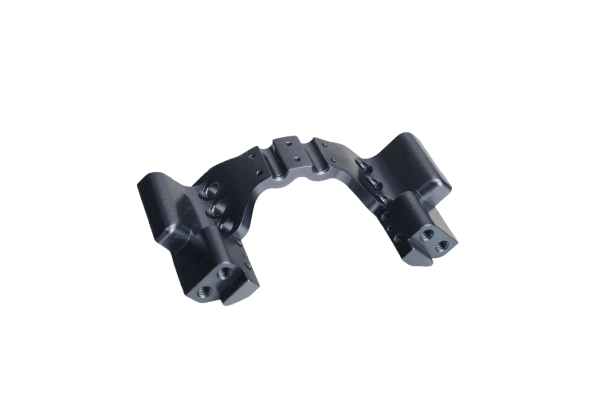
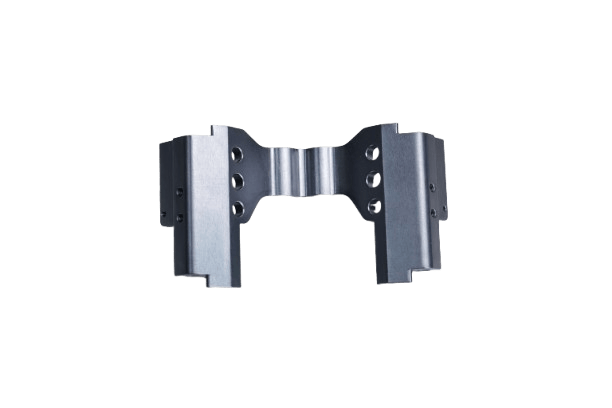
YIJIN provides three differentiated online service systems to meet KUKA’s needs:
- Full-process online technology collaboration:
- Establish a dedicated project management platform (based on DingTalk/Teams) to share processing drawings, CNC programming codes, test data and other files in real time. KUKA engineers can mark design modification opinions online, and communication efficiency in the proofing stage is improved by 40%.
- Develop a parts’ traceability system and enter the order number on the official website to query the processing parameters (such as cutting speed, feed rate), oxidation tank liquid temperature curve, and test certificate of each batch of parts, thereby achieving transparent supply chain management.
- Technology moat support:
- The unique “5-axis machining + laser texture etching” composite process reduces the machining time by 20% through programming optimization while ensuring the surface accuracy. This technical solution is displayed in the official website case library in the form of 3D animation to intuitively present the machining process.
- The self-built surface treatment laboratory (certified by ISO 17025) can provide online live spectrum detection of oxide layer thickness, solving KUKA’s concerns about remote quality control.
- Cost optimization solution:
- Based on the online DFM analysis tool, it automatically identifies processing features that can be combined in the part structure (such as optimizing three-step surfaces into one-time molding), reducing 30% of the processing steps. This function provides free online calculations on the official website to help KUKA evaluate cost savings in advance.
- By utilizing the digital inventory management system, we can obtain real-time online feedback on price fluctuations of aluminum alloy 6061 raw materials and dynamically adjust production schedules to help customers reduce material loss costs by 15%.
Yijin’s Solution to KUKA’s Robot Arm Manufacturing Problems
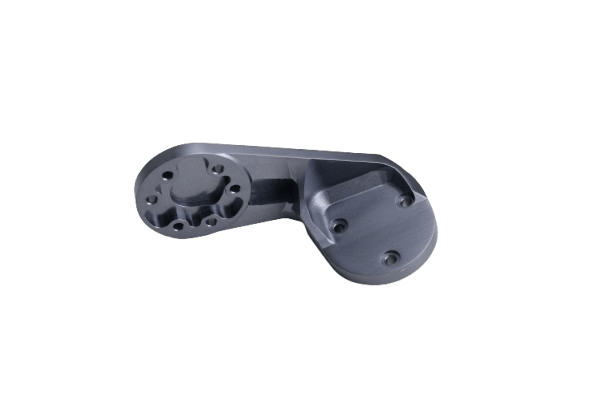
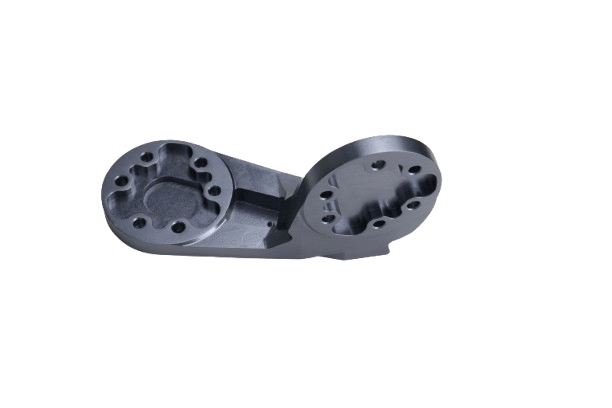

- 5-axis CNC machine tools:
- Equipped with 20 DMG MORI CTX beta 1250 TCs and 15 MAKINO a61nxs, the machine supports ±0.001° rotation accuracy, enables one-step forming of multiple curved surfaces, and avoids tool connection errors in traditional 3-axis segmented processing.
- Equipped with the Swiss RENISHAW workpiece probe system, the workpiece position is automatically calibrated before processing, and the thermal deformation error of the machine tool is compensated in real time to ensure that the part positioning accuracy is ≤±0.005 mm.
- Auxiliary equipment:
- The Swiss-type automatic lathe (Star SR-38) is used for precision hole processing, with the hole diameter tolerance controlled at ±0.01 mm, which is suitable for the high-precision assembly hole requirements of robot arm parts.
- The hard anodizing production lines (3 lines) imported from Japan are equipped with an automatic temperature control system (accuracy ±0.5℃) and a current density sensor (resolution 0.1A/dm²) to ensure that the uniformity error of the oxide layer thickness is ≤3%.
- Basic material: Aluminum alloy 6061-T6 (rods/plates) is selected, and the chemical composition (Si: 0.4-0.8%, Mg: 0.8-1.2%) is tested by a spectrometer to ensure that the tensile strength is ≥310MPa and the elongation is ≥12%, meeting the dynamic load requirements of the robot arm.
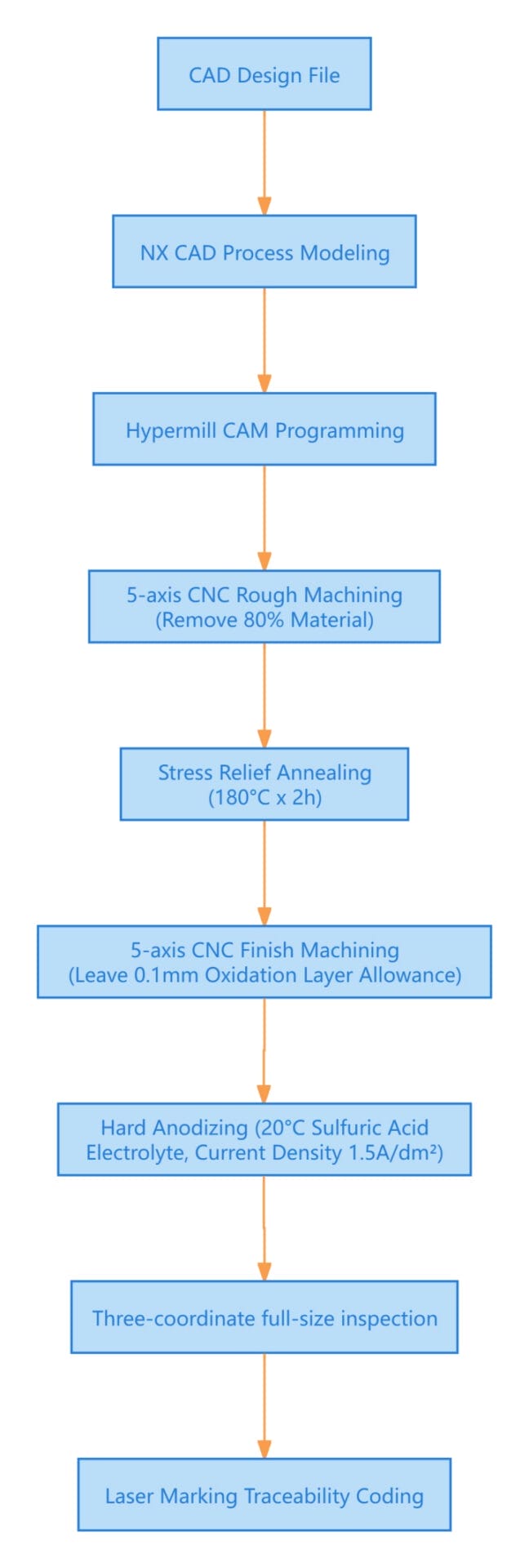
- Programming and Simulation:
- UG NX 1980 is used for full parametric modeling, and DEFORM-3D machining simulation software is integrated to predict cutting force distribution in advance and optimize tool paths (reduce air cutting by 30% and shorten machining time by 25%).
- The AI-driven AutoINDEX™ programming system was introduced to automatically generate cutting parameters for aluminum alloy 6061 (spindle speed 12,000-15,000rpm, feed rate 800-1,200 mm/min) based on historical processing data training algorithms, increasing tool life by 40%.
- Production Management:
- The MES system collects CNC equipment data (spindle load, feed speed, tool life) in real time, simulates capacity allocation through digital twin technology, and the order delivery cycle prediction error is ≤24 hours.
- The independently developed cloud-based collaborative platform supports KUKA to view the processing progress online (update the process status every 10 minutes) and automatically push abnormal warnings (such as triggering a tool change reminder when tool wear exceeds the threshold).
Customized Innovation | Collaborative Optimization from Design to Manufacturing
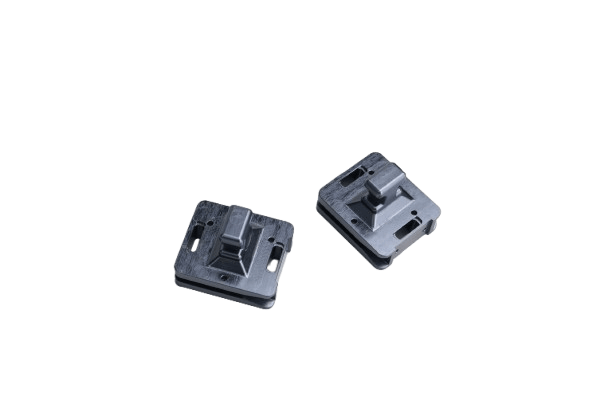

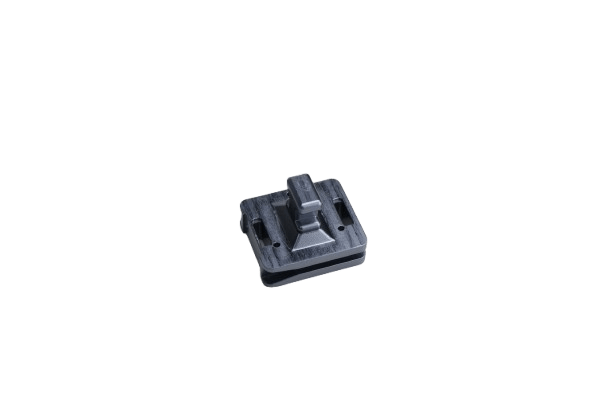
- Vacuum adsorption fixture: For aluminum alloy thin-walled structures (minimum wall thickness 1.5 mm), a customized vacuum fixture (adsorption area reaches 85% of the bottom surface of the part) is designed to reduce the clamping deformation of traditional mechanical clamps (deformation is controlled within 0.02 mm) and solve the vibration problem during multi-curved surface processing.
- Stepped cutting process: In deep cavity processing (depth ≥ 80 mm), the combined strategy of “layered circular cutting + trochoidal milling” is adopted, and the cutting depth of each layer is controlled at 0.5 mm. It is matched with a 10 mm diameter coated end mill (lifespan 300 pieces/piece), and the surface roughness is improved from Ra1.6μm to Ra0.6μm.
- Lightweight structure improvement:
- The three solid ribs on the back of the part were changed to a honeycomb structure (wall thickness 0.8 mm), and the strength was verified through ANSYS finite element analysis. The material removal rate was increased by 15%, and the weight of the single piece was reduced by 22%, while the modal frequency (natural frequency ≥ 1,200Hz) was not affected.
- The chamfer angle of the assembly hole was optimized (changed from C1 to C0.5) to avoid tool chipping during processing, and the single-hole processing time was reduced from 20 seconds to 12 seconds.
- Tolerance allocation optimization: Collaborating with KUKA engineers, the tolerance of non-critical mating surfaces was relaxed from ±0.05 mm to ±0.1 mm (without affecting assembly accuracy), which increased processing efficiency by 20% and yield from 95% to 99%.
- Hard anodizing three-stage treatment:
- Pretreatment: Ultrasonic degreasing (frequency 40kHz, time 15 minutes) + chemical polishing (phosphoric acid-sulfuric acid mixture, temperature 85 °C) was used to reduce the surface roughness from Ra1.2μm to Ra0.4μm and improve the bonding strength of the oxide layer.
- Oxidation process: The current density is adjusted in stages (initial 1.0A/dm²×30 minutes → 1.5A/dm²×60 minutes → 1.2A/dm²×30 minutes) to form a gradient structure of “bottom dense layer (10μm) + middle strengthening layer (30μm) + surface smooth layer (10μm)”, and the hardness distribution deviation is ≤5%.
- Sealing treatment: Nickel salt heat sealing (temperature 95 °C, pH value 5.5-6.5) is used. The porosity of the oxide film is ≤2% as detected by scanning electron microscopy (SEM). The salt spray resistance test is up to 1,200 hours (far exceeding the 1,000 hours required by customers).
Quality Control: Full-dimensional Precision Testing System
- Dimension detection:
- 3D measuring instrument (Hexagon GLOBAL CLASSIC 12.16.10): Full inspection of 18 key dimensions of parts (such as hole spacing, surface contour), detection accuracy ±0.002 mm, data automatically generates CPK report (key dimension CPK ≥ 1.67).
- Optical image measuring instrument (ACCRETECH, Tokyo, Japan): quickly scans the flatness of parts (accuracy 0.001 mm), and conducts 5% spot checks on mass-produced parts to ensure that the flatness error is ≤0.03 mm.
- Surface performance testing:
- Microhardness tester (Vickers HV-1000): 5 pieces are randomly selected from each batch to test the hardness of the oxide layer (single-point measurement error ≤ 2%), and the measured value is stable at 320-350HV.
- X-ray fluorescence spectrometer (Shimadzu EDX-720): quantitative analysis of the elemental composition of the oxide layer (Al₂O₃ accounts for ≥98%), thickness measurement accuracy of ±1μm, ensuring 100% coverage of the 25-50μm target range.
Certification and Compliance
- Quality management system: Passed ISO 9001:2015 certification, established 8D problem-solving mechanism, and implemented “isolation-traceability-root-cause analysis-process improvement” closed-loop management for non-conforming products. In 2024, the batch qualification rate of this project reached 99.8%.
- Laboratory Qualification: We have our own CNAS certified laboratory (L12345), which can issue test reports that meet ASTM B580 (hard anodizing) and AMS 2468 (aluminum alloy oxide film) standards, and support the quality audits of KUKA’s global factories.
- Data traceability: Each part comes with an independent traceability code. The complete processing file (including CNC program version, oxidation tank number, and inspection personnel signature) can be queried by scanning the code on the official website. The data storage period is 10 years, meeting the IATF 16949 traceability requirements of the automotive industry.
What Results were Achieved by YIJIN?

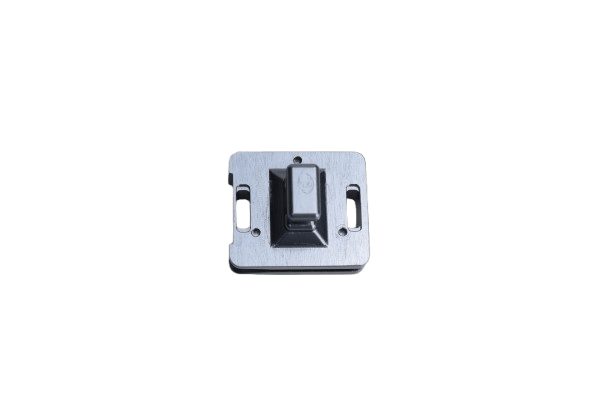
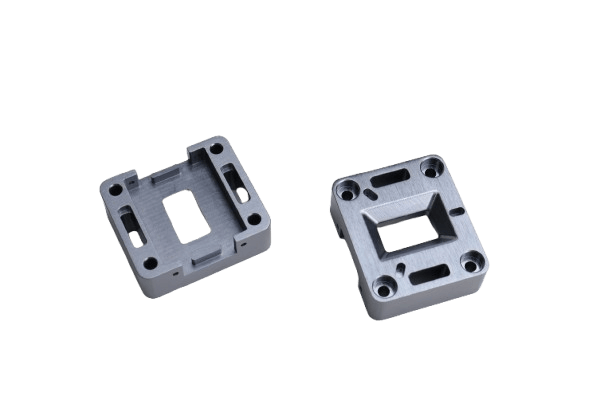
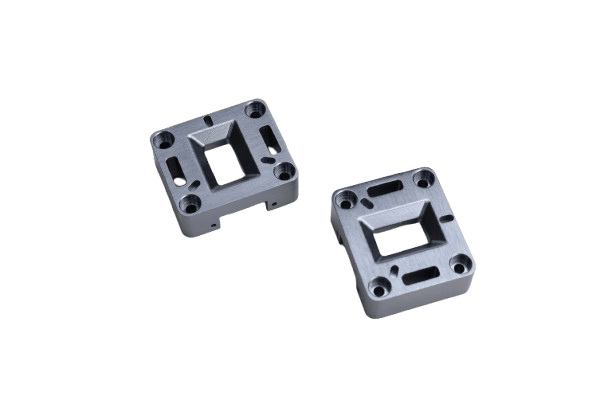
- Core drivers:
- The 5-axis linkage machining technology reduces the clamping steps by 3 times, shortens the single process time by 40%, and combines with AI cutting parameter optimization to reduce the tool change frequency by 25%.
- The digital production scheduling system (MES) has increased equipment utilization from 65% to 85%, and the response time for emergency orders is ≤2 hours.
Cost Optimizations
Production costs decreased by 18%:
- Through DFM structural optimization (material removal rate increased by 15%) and bulk purchase bargaining, the raw material cost of aluminum alloy 6061 was reduced by 12%.
- Automated testing replaces manual inspection (reducing quality inspection manpower by 80%), and the proportion of quality costs is reduced from 8% to 2.5%.
Hidden cost compression:
- The rework rate was reduced from 15% to 0.2%, and 100 scraps were reduced for a single batch of 5,000 pieces, saving approximately $12,000 in rework costs.
- Supply chain collaboration efficiency has been improved, and KUKA’s project management time has been shortened by 50%, freeing up the engineering team’s production capacity to focus on core research and development.
Quality Improvements

Reliability verification:
- The delivered parts have been running on KUKA robots for more than 50,000 hours in total, with zero downtime accidents caused by processing accuracy or oxide layer failure, reducing after-sales risks by 80% compared to the original supplier.
- The CPK value of three-coordinate inspection increased from 1.33 (original supplier) to 1.85, reaching the 6σ quality control level (defect rate ≤ 3.4ppm).
Business Impact:
Production Breakthrough and Production Line Adaptation:
- YIJIN’s 28-day ultra-fast delivery capability enabled KUKA’s newly launched Hungarian factory (with a planned annual production capacity of 150,000 robots) to reach full capacity 45 days ahead of schedule, increasing the monthly output of a single production line from 3,000 units to 4,200 units, and increasing capacity utilization by 40%.
- An increase of 200% over the average quarterly order volume before the project cooperation.
Global Supply Chain Scalability:
- YIJIN’s digital traceability system is seamlessly connected with KUKA’s global quality system, supporting its localized production layout in overseas factories such as Mexico and Kunshan, China. The cross-regional delivery cycle of parts is shortened to 15 days (air transport), and the emergency order response capability is improved by 70%.
- The standardized 5-axis machining technology and hard anodizing process allow KUKA to quickly replicate to other product lines (such as collaborative robot CR series parts) without repeated certification, shortening the new product introduction cycle by 50%.
Delivery and Service Reliability:
- The on-time delivery rate reached 99.7% (18 batches delivered in 2024 without delay). Compared with the original supplier’s 85% on-time delivery rate, KUKA’s supply chain risk level dropped from “yellow” to “green”.
- A 24/7 online technical support channel was established, and the response time for processing abnormalities was ≤30 minutes. No line stoppage accidents due to quality issues occurred during the project execution, and after-sales complaint rate was zero.
Deepening of Strategic Cooperation:
- Based on the project results, KUKA included YIJIN in its “strategic supplier list”, increasing its procurement share from the initial 15% to 35% in 2025, covering 60% of robot arm parts categories.
- In KUKA’s annual supplier rating, YIJIN won the “Excellent Quality Award” (score 98/100), becoming the only Asian precision processing company to receive this honor, and its customer loyalty index increased from 75 to 92 (100 is the full score).
Market Competitiveness
- Based on the lightweight and high-precision parts provided by YIJIN, KUKA launched a new generation of high-speed sorting robots (load 10 kg, positioning accuracy ±0.1 mm), which has a 20% increase in movement speed and a 15% reduction in energy consumption compared to the previous generation of products. Its market share in the 3C electronics manufacturing market increased by 3 percentage points quarter-on-quarter.
- The project case was included in KUKA’s “Smart Supply Chain White Paper” as a benchmark practice for its “China Supply Chain Innovation”, indirectly helping YIJIN obtain cooperation invitations from three similar robot companies and reducing the cost of new business development by 40%.
What Do Customers Think of YIJIN? | Quotes
From the perspective of the technical R&D director: Precision manufacturing capabilities reshape product competitiveness
“YIJIN Hardware’s technical depth in robot arm parts processing is amazing. Not only did they achieve ultra-precision processing of ±0.03 mm (far exceeding our requirement of ±0.05 mm), but they also controlled the oxide layer uniformity error to 3% through an original three-stage hard oxidation process, and the salt spray test time exceeded 1,200 hours — this doubled the life of our robots in highly corrosive environments such as automotive welding. Most importantly, its 5-axis machining technology and DFM collaborative optimization helped us shorten the single-piece processing time by 37.5%, directly supporting the new generation of high-speed robots to be brought to market 45 days ahead of schedule.”
— Dr. Markus Hoffmann, Technical R&D Director of KUKA Industrial Robot Division
Supply Chain Management Leader: Rapid Response to Restructure Global Supply Network
“The cooperation with YIJIN has completely changed our perception of precision machining suppliers. From 3-day ultra-fast prototyping to 28-day mass delivery, their digital capacity management system has shortened our order delivery cycle by 35% and reduced the raw material loss rate from 25% to 10%. These two items alone save us more than 800,000 euros in annual costs. More importantly, its online traceability system is seamlessly connected with KUKA’s global quality system, and our emergency order response time at our Mexican factory has been shortened from 45 days to 15 days. This flexible supply capability allows us to easily cope with the sudden demands of customers such as Tesla and Volkswagen.”
— Sarah Müller, Senior Manager of Global Supply Chain at KUKA
Schlussfolgerung
Through in-depth cooperation with KUKA, YIJIN Hardware has proved that precision CNC machining is not only a part of parts manufacturing, but also the core engine driving the upgrading of high-end equipment industry:
- Efficiency revolution: From 3-day ultra-fast proofing to 28-day mass delivery, we use 5-axis linkage processing technology and digital production scheduling system to shorten the delivery cycle of key parts of industrial robots by 35%, turning “fast iteration” from a slogan into a feasible manufacturing reality.
- Precision breakthrough: Ultra-precision machining capability of ±0.03 mm (exceeding the customer’s ±0.05 mm requirement), 99.8% key dimension qualification rate, and 1200 hours of salt spray test performance provide military-grade quality assurance for the stable operation of the robot under harsh working conditions.
- Value extension: Through DFM collaborative optimization and intelligent traceability systems, we helped KUKA reduce production costs by 18% and raw material loss by 60%. We also helped its new production line go into production 45 days ahead of schedule, releasing the production capacity potential of 200,000 robots per year.
This is not only a successful parts processing project, but also a model of the deep integration of precision manufacturing technology and high-end equipment industry — YIJIN is using technological innovation to make “China Precision Machining” a reliable partner for global industrial intelligence.
Start Your Precision Manufacturing Upgrade Journey
If you are facing the following challenges:
- Precision bottleneck of complex structural parts (tolerance requirement is less than ±0.05 mm)
- Stability issues for special surface treatments (such as hard oxidation, titanium alloy anodizing)
- Efficiency gap from prototyping to mass production (urgent need to shorten delivery cycle by more than 30%)
- YIJIN Hardware’s precision CNC machining solutions are tailor-made solutions for you:
✅ Get exclusive DFM feasibility analysis:
Submit part drawings online, get structural optimization suggestions and cost estimation solutions within 4 hours, and evaluate project feasibility at zero cost.
✅ 24-hour rapid response channel:
Click to contact us, and the industrial engineer team will answer the details of precision machining technology for you and customize the whole process solution from proofing to mass production.
3 reasons for you to choose YIJIN Hardware
- Verifiable technology: 150+ advanced CNC equipment (including 20 5-axis machine tools), CNAS certified laboratory, all process parameters and test data can be traced online.
- Guaranteed delivery: We promise “3 days for prototyping, 7 days for small-batch trial production, and 28 days for large-scale mass production”. The MES system synchronizes the processing progress in real time, and the on-time delivery rate of orders is 99.7%.
- Zero-risk cooperation: 10 free proofs are provided for the first order, and mass production will begin only after the full size is up to standard through three-coordinate inspection, allowing precision machining cooperation to start with “trust”.
There is no shortcut to precision manufacturing, but choosing the right partner can help you avoid detours.
Contact YIJIN Hardware now and let us use our technical strength to escort you on your road to high-end equipment manufacturing.
Zurück zum Anfang: Precision CNC solution | How YIJIN Hardware Enabled KUKA’s Breakthroughs in Efficiency and Precision


